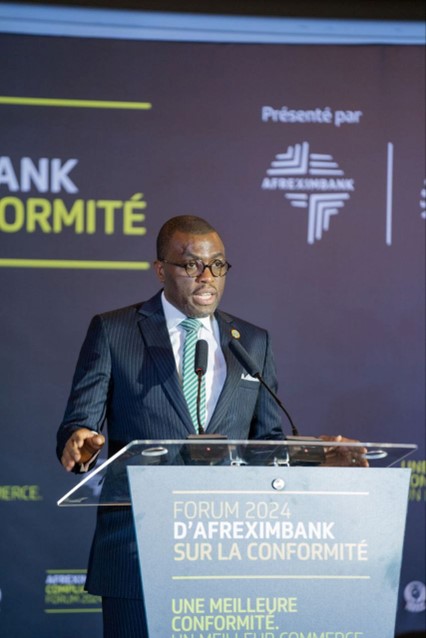By Bernard Yaw ASHIADEY & Ebenezer Chike Adjei NJOKU
As African trade continues to lag behind global averages, financial institutions – compliance and trade facilitating functions are turning to cutting-edge digital solutions to navigate the complex landscape of regulatory compliance without hampering economic growth and breaching the regulatory sanctions.
This shift towards digitization was a key focus at the 9th Afreximbank Compliance Forum held in Dakar, Senegal, where banking industry leaders gathered to discuss the future of African trade.
The forum, which was organised in partnership with the Inter-Governmental Action Group against Money Laundering in West Africa (GIABA) was sponsored by some banks including Vista Bank, GCB Bank, Wave, Rawbank, SUNU Group and compliance system providers such as Lexus Nexis, Elucidate, Finanstra and Llyod’s List Intelligence, Consortix, and Vneuron.
The Forum focused on the Financial Action Task Force’s (FATF) requirements for identifying Ultimate Beneficial Owners (UBOs) and their far-reaching implications for trade facilitation.
The FATF, an intergovernmental organisation, sets international standards to prevent money laundering, terrorist financing, and other threats to the integrity of the global financial system. One of its critical mandates is to identify and verify UBOs to ensure transparency and accountability in financial transactions.
Additionally, the Forum explored the transformative role of Artificial Intelligence (AI) in compliance processes, address strategies for African countries to make the necessary reforms to be removed from the FATF’s grey list and showcase the latest compliance technologies.
There were sessions under the topics, ‘Compliance Control Systems and their use in Financial Crime Risk Management’ and ‘The impact of AI on Compliance Systems’. These sessions discussed and provided participants with information on the use of compliance systems in the management of financial crime and impact of artificial intelligence on compliance systems. Compliance system providers and experts facilitated these panels or sessions.
Jean Arsène Yerima, Regional Chief Operating Officer, Francophone West Africa, Afreximbank – in a speech on behalf of Dr. George Elombi, Executive Vice President of Corporate Governance and Legal Services – emphasized the critical role of technology in his keynote address. “Digitization provides smarter, efficient, and effective solutions to manage financial crimes risks through automation of key processes with artificial intelligence and machine learning,” he stated.
The push for digital solutions comes at a crucial time for African trade. Despite the implementation of the African Continental Free Trade Area (AfCFTA) agreement in January 2021, intra-African trade has declined from 14.5percent in 2021 to 13.7percent in 2022.
This downturn is attributed to the challenges posed by stringent compliance requirements, particularly those related to anti-money laundering (AML) and countering the financing of terrorism (CFT) and more importantly the trade based money laundering (TBML).
Enter the Africa Trade Gateway (ATG), a flagship initiative by Afreximbank that exemplifies the potential of digital solutions in addressing these challenges. The ATG is a suite of five interconnected digital platforms designed to provide critical services supporting African trade and the implementation of the AfCFTA.
One of the key components of the ATG is the MANSA due diligence platform. Named after Mansa Musa, the wealthy 14th-century emperor of the Mali Empire, MANSA aims to address the challenge of perceived risk and the lack of African customer information.
The platform provides a single source of primary data required for Customer Due Diligence (CDD) and Know Your Customer (KYC) checks on African entities, enabling African companies to do business with their counterparts around the world.
Another crucial element of the ATG is the Pan-African Payment and Settlement System (PAPSS). This platform facilitates instant cross-border payments in local African currencies, significantly reducing the reliance on hard currencies for intra-African trade.
By streamlining payment processes and reducing currency conversion costs, PAPSS not only enhances trade efficiency but also minimizes compliance risks associated with cross-border transactions.
The Africa Trade Exchange (ATEX), also part of the ATG ecosystem, is a B2B and B2G platform enabling bulk procurement of basic commodities. ATEX aims to ensure countries’ access to scarce supplies in a transparent manner, thereby reducing the risk of trade-based money laundering.
The emphasis on digital solutions extends beyond Afreximbank’s initiatives. The forum also highlighted the role of third-party service providers in enhancing compliance capabilities. Compliance system providers such as Lexus Nexis, Elucidate, Finanstra, Llyod’s List Intelligence, Consortix, and Vneuron showcased advanced software solutions that leverage AI and machine learning to automate key compliance processes.
These technologies are particularly crucial in addressing the Financial Action Task Force (FATF) requirements regarding the identification of Ultimate Beneficial Owners (UBOs). By automating the complex process of UBO identification and verification, these digital solutions can significantly reduce the compliance burden on African businesses while maintaining high standards of due diligence.
However, the adoption of these digital solutions is not without challenges. “Infrastructure deficits and limited digital literacy in some regions remain significant hurdles,” notes Mr. Yerima. “We need a concerted effort from governments, financial institutions, and technology providers to bridge these gaps.”
Despite these challenges, the momentum towards digitization in African trade compliance is undeniable. As more countries and businesses adopt these technologies, the continent could see a significant boost in trade efficiency and a reduction in perceived risks.
The coming years will be critical in determining whether these digital solutions can indeed bridge the gap between stringent compliance requirements and the need for trade facilitation. If successful, they could play a pivotal role in unlocking Africa’s vast economic potential and reshaping its position in global trade. “It is time to change the African narrative. With the right digital tools and a commitment to both compliance and growth, we can create a thriving, interconnected African economy that is fully integrated into global trade networks,” Mr. Yerima argued.
>>>the coverage of the forum in Dakar, Senegal was made possible by the kind courtesy of Ecobank Ghana, Fidelity Bank Ghana and OmniBSIC Bank Ghana. We at the B&FT appreciate their support. Thank you










